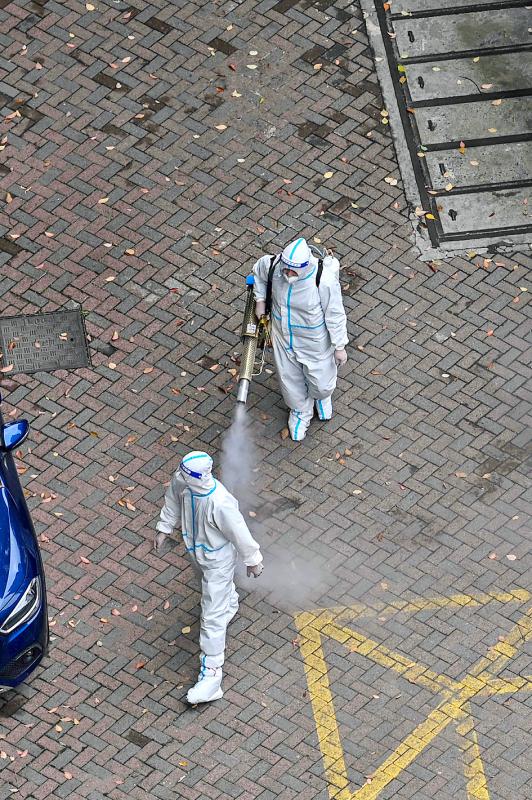Leaving a fine mist of disinfectant in their wake, China’s hazmat-clad health workers are cleaning homes, roads, parcels and even people — but more than two years into the COVID-19 pandemic, experts say it is a futile measure against the virus.
China is tied to a “zero COVID” strategy, wielding snap lockdowns, mass testing and lengthy quarantines as part of unrelenting efforts to quash virus outbreaks no matter the cost to the economy or freedoms of its people.
Among its arsenal of virus controls is disinfectant spraying, which a top Shanghai official earlier this month lauded as a key part of a “grand assault” on the virus.

Photo: AFP
Footage shows legions of “big whites” — as health workers in hazmat suits are referred to in China — spraying apartments after their inhabitants have been taken into state quarantine.
The sight has become one of the most visual expressions of China’s “zero COVID” policy, which has taken on a political dimension as Chinese President Xi Jinping (習近平) has pegged the legitimacy of his leadership on protecting Chinese lives from the virus.
Personal possessions and home furnishings lie amid clouds of cleanser, the images show, while in other cases the targets are city streets, walls and parks.
However, such labor-intensive campaigns are relatively pointless against a virus that spreads through droplets expelled in coughs and sneezes into the air, experts said.
“Since infection through touching contaminated surfaces is not an important route of transmission, extensive and aggressive use of disinfectant is not necessary,” said Yanzhong Huang (黃嚴忠), a senior fellow for global health at the New York-based Council on Foreign Relations.
Transmission through contaminated surfaces and objects is possible, but comparatively rare.
The odds have not deterred China’s disinfectant sprayers.
Shanghai alone had sterilized 13,000 areas as of May 2 under a policy targeting infected people’s homes, apartment blocks and “preventive” disinfection of entire compounds, Shanghai Vice Mayor Liu Duo (劉多) said.
The city has seethed for weeks under a shifting mosaic of lockdowns that have seen some of its 25 million residents scuffle with police and unleash a flood of fury and frustration on social media.
In one social media video verified by Agence France-Presse, a hazmat-suited health worker brandishing a powerful hose sprays clouds of disinfectant on a resident’s bed, desk and clothes.
Other clips show workers wandering through streets and housing compounds, casually spritzing walls, scooters and even the ground.
One Shanghai resident said that his home was sterilized twice after they returned from quarantine, with his family being ordered to wait outside for an hour each time.
While the virus can transmit through surfaces, “it cannot survive long outside the human body, so it is unnecessary to sterilize outdoor surfaces,” Huang said. “The widespread use of some chemical disinfectants, such as chlorine disinfectant, could have harmful impacts on human health [and] the environment.”
Leong Hoe Nam, an infectious-disease expert at Singapore’s Mount Elizabeth Novena Hospital, said outdoor disinfection is “absolutely pointless.”
Leong said the disinfection drive was mostly “a lot of visible intervention that pleases administrators” without doing much to prevent the virus spreading.
However, Beijing’s desire to demonstrate its commitment to a flagship policy is perhaps the more important aspect, Huang said.
The move “conjures up the image of a heroic battle against an invisible enemy,” he said.

The collapse of the Swiss Birch glacier serves as a chilling warning of the escalating dangers faced by communities worldwide living under the shadow of fragile ice, particularly in Asia, experts said. Footage of the collapse on Wednesday showed a huge cloud of ice and rubble hurtling down the mountainside into the hamlet of Blatten. Swiss Development Cooperation disaster risk reduction adviser Ali Neumann said that while the role of climate change in the case of Blatten “still needs to be investigated,” the wider impacts were clear on the cryosphere — the part of the world covered by frozen water. “Climate change and

Poland is set to hold a presidential runoff election today between two candidates offering starkly different visions for the country’s future. The winner would succeed Polish President Andrzej Duda, a conservative who is finishing his second and final term. The outcome would determine whether Poland embraces a nationalist populist trajectory or pivots more fully toward liberal, pro-European policies. An exit poll by Ipsos would be released when polls close today at 9pm local time, with a margin of error of plus or minus 2 percentage points. Final results are expected tomorrow. Whoever wins can be expected to either help or hinder the

DENIAL: Musk said that the ‘New York Times was lying their ass off,’ after it reported he used so much drugs that he developed bladder problems Elon Musk on Saturday denied a report that he used ketamine and other drugs extensively last year on the US presidential campaign trail. The New York Times on Friday reported that the billionaire adviser to US President Donald Trump used so much ketamine, a powerful anesthetic, that he developed bladder problems. The newspaper said the world’s richest person also took ecstasy and mushrooms, and traveled with a pill box last year, adding that it was not known whether Musk also took drugs while heading the so-called US Department of Government Efficiency (DOGE) after Trump took power in January. In a

It turns out that looming collision between our Milky Way and Andromeda galaxies might not happen after all. Astronomers on Monday said that the probability of the two spiral galaxies colliding is less than previously thought, with a 50-50 chance within the next 10 billion years. That is essentially a coin flip, but still better odds than previous estimates and farther out in time. “As it stands, proclamations of the impending demise of our galaxy seem greatly exaggerated,” the Finnish-led team wrote in a study appearing in Nature Astronomy. While good news for the Milky Way galaxy, the latest forecast might be moot